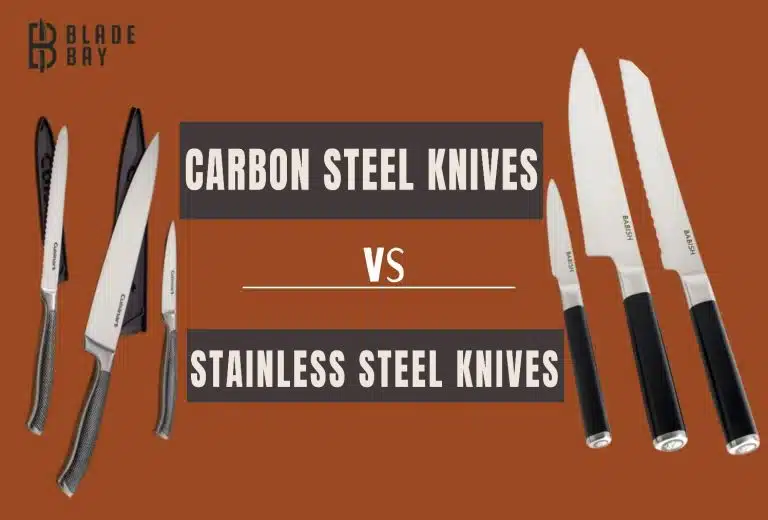Mastering Carbon Steel Knife Care: Your Essential Guide
Table of Contents
ToggleMastering Carbon Steel Knife Care: Your Essential Guide
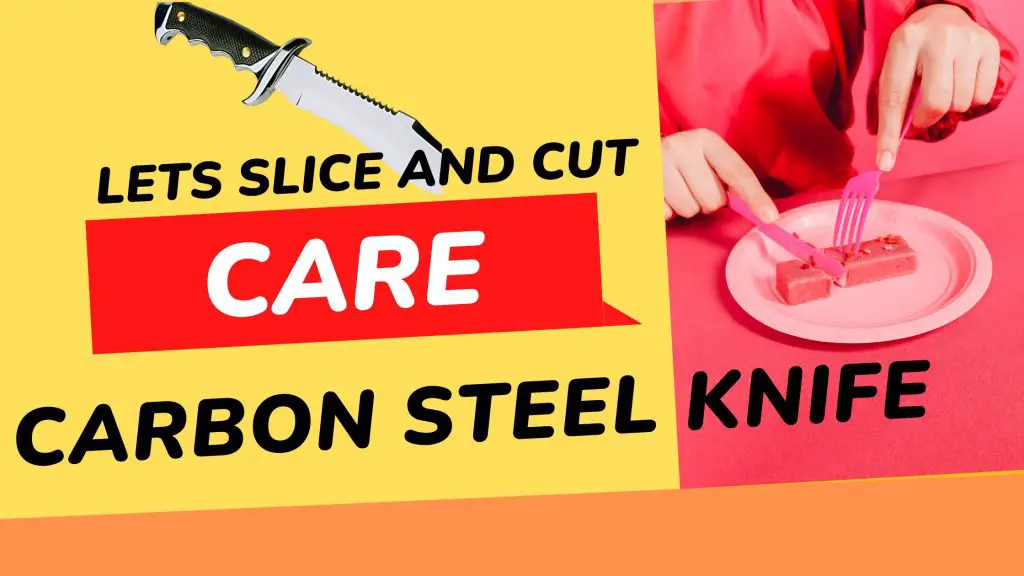
Carbon steel knives have become increasingly popular among chefs and home cooks for their durability, sharpness, and precision.
But to keep your carbon steel knife performing at its best, proper care and maintenance are essential.
In this review, we will discuss the importance of caring for your carbon steel knife and introduce you to some of the best carbon steel knives on the market.
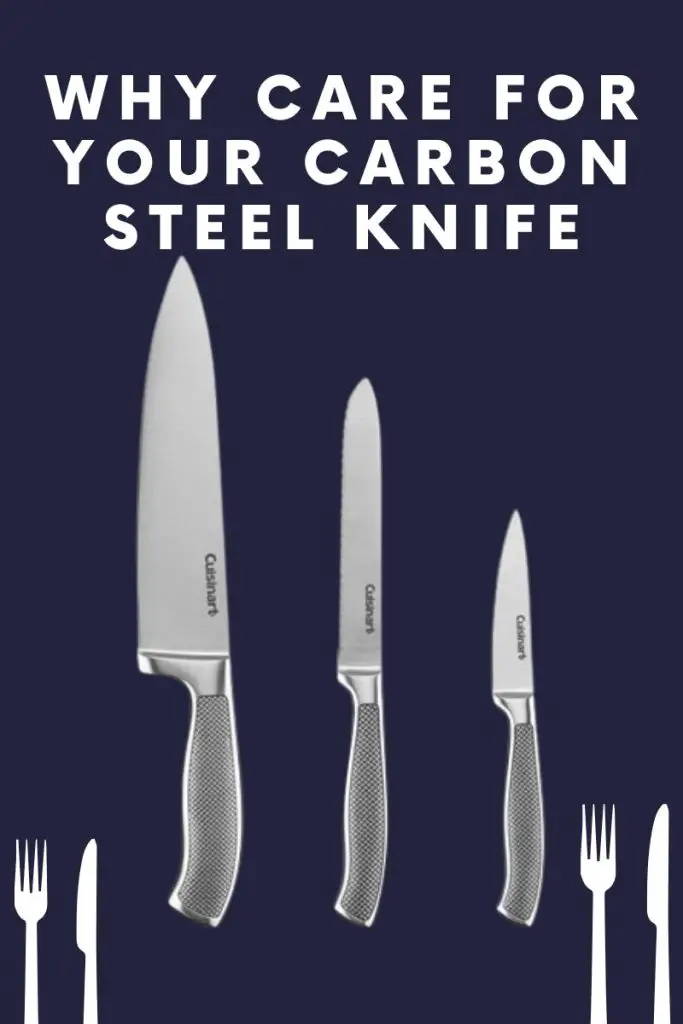
Why Care for Your Carbon Steel Knife?
Carbon steel knives require proper care and maintenance to ensure they remain sharp and durable.
If you don’t take care of your carbon steel knife, it may become dull, rusty, and even chip or break over time.
Proper care involves cleaning, drying, and storing your knife correctly, as well as regularly sharpening it to maintain its edge.
What is the best way to sharpen a carbon steel knife?
sharpness and durability compared to other types of knives, making them well-suited for a wide range of tasks in the kitchen.
However, over time, even the best carbon steel knives can become dull and lose their effectiveness.
That’s why it’s important to know the best way to sharpen a carbon steel knife.
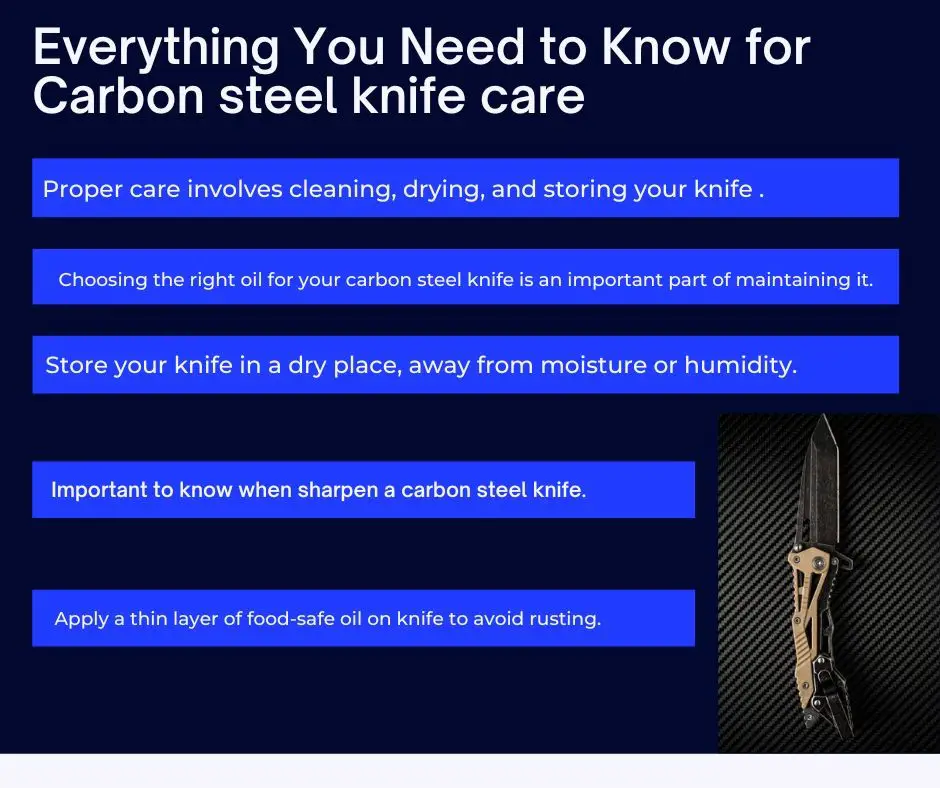
Why Sharpening Is Important
Before we dive into the best way to sharpen a carbon steel knife, let’s take a moment to talk about why sharpening is important.
A dull knife can be frustrating to use and can actually be more dangerous than a sharp knife.
A dull knife requires more force to cut, which can increase the risk of accidents.
Additionally, a dull knife can actually damage the food you’re cutting, as it can crush or tear the food instead of slicing cleanly through it.
When to Sharpen
It’s important to know when to sharpen your carbon steel knife. Generally, you should sharpen it when it feels dull or can no longer cut through food easily. But, there are other signs to look out for.
If your knife is slipping or skidding off the food or has small nicks or chips in the blade, it’s time to sharpen it.
Tools You'll Need
To sharpen your carbon steel knife, you’ll need a few tools. First, you’ll need a sharpening stone.
There are many different types of sharpening stones available, but a high-quality, fine-grit stone is best for carbon steel knives.
You’ll also need a honing steel, which is a long, narrow rod used to straighten and realign the edge of the knife.
Finally, you’ll need a damp cloth or towel to clean the blade.
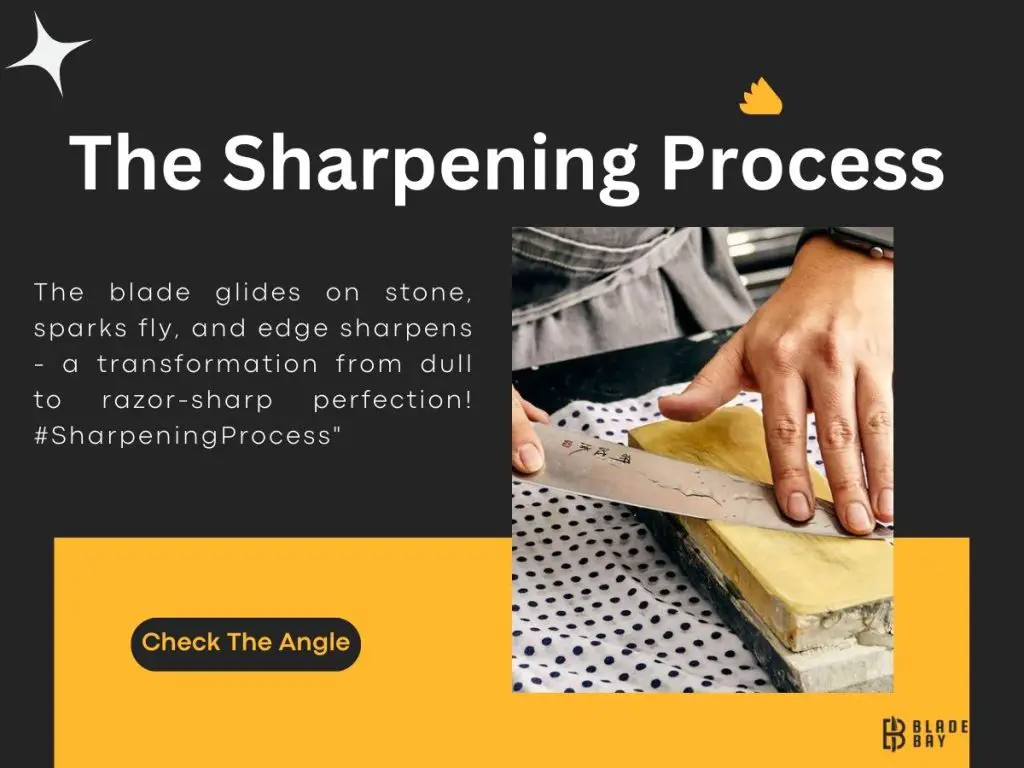
The Sharpening Process
To sharpen your carbon steel knife, start by soaking the sharpening stone in water for 10-15 minutes.
Place the stone on a flat surface with the coarse side facing up.
Hold the knife at a 20-degree angle and run the blade along the whetstone, starting at the base and working towards the tip.
Use light pressure and make sure to keep the angle consistent. Repeat this process on the other side of the blade.

What oil should I use on my carbon steel knife?
Choosing the right oil for your carbon steel knife is an important part of maintaining its quality and preventing rust. Here are some tips on what oil to use:
Mineral oil: Mineral oil is a popular choice for carbon steel knives as it is inexpensive and easily accessible.
It is also food-safe, which means it won’t contaminate your food.
Camellia oil: Camellia oil is a traditional choice for Japanese knives and is known for its ability to protect the blade against rust.
It is also food-safe and easy to apply.
Tsubaki oil: Tsubaki oil is another type of camellia oil that is specifically designed for knives.
It is a bit more expensive than regular camellia oil but is known for its superior protection against rust.
WD-40: While not technically an oil, WD-40 can be used to protect carbon steel knives against rust.
However, it is not food-safe and should not be used on knives that come into contact with food.
By choosing the right oil and applying it correctly, you can ensure that your carbon steel knife remains in top condition for years to come.
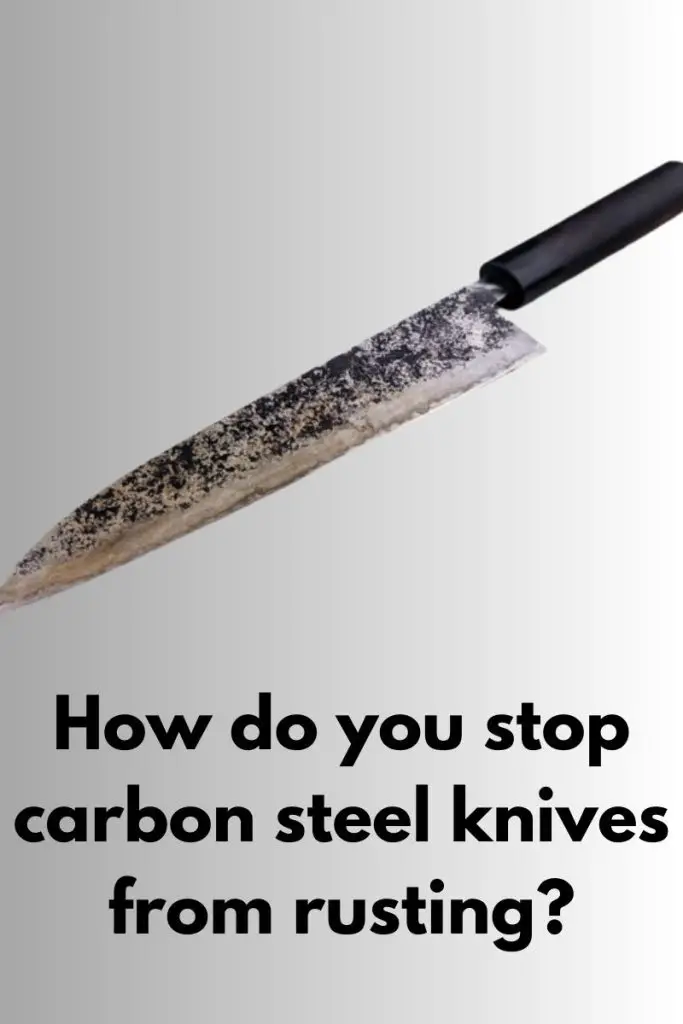
How do you stop carbon steel knives from rusting?
Carbon steel knives are prized for their sharpness and durability, but they do require a little extra care to prevent rusting.
Luckily, there are several easy steps you can take to keep your carbon steel knives in top condition and prevent rust from forming.
First and foremost, it’s important to clean and dry your knives thoroughly after each use.
This means wiping the blade down with a dry cloth or paper towel and ensuring that no moisture remains on the blade or handle.
You should also avoid leaving your knives in the sink or dishwasher, as prolonged exposure to water can lead to rusting.
Another effective way to prevent rust on your carbon steel knives is to apply a thin layer of food-safe oil to the blade after each use.
This will help to protect the metal from moisture and oxidation, and keep your knife in great condition for years to come.
Be sure to use an oil that is safe for use with food, such as mineral oil or vegetable oil.
Finally, storing your knives properly can also help to prevent rust. Keep them in a dry, cool place, and avoid storing them in a sheath or knife block where moisture can accumulate.
A simple magnetic knife holder or a knife rack can be a great option for storing your knives safely and conveniently.
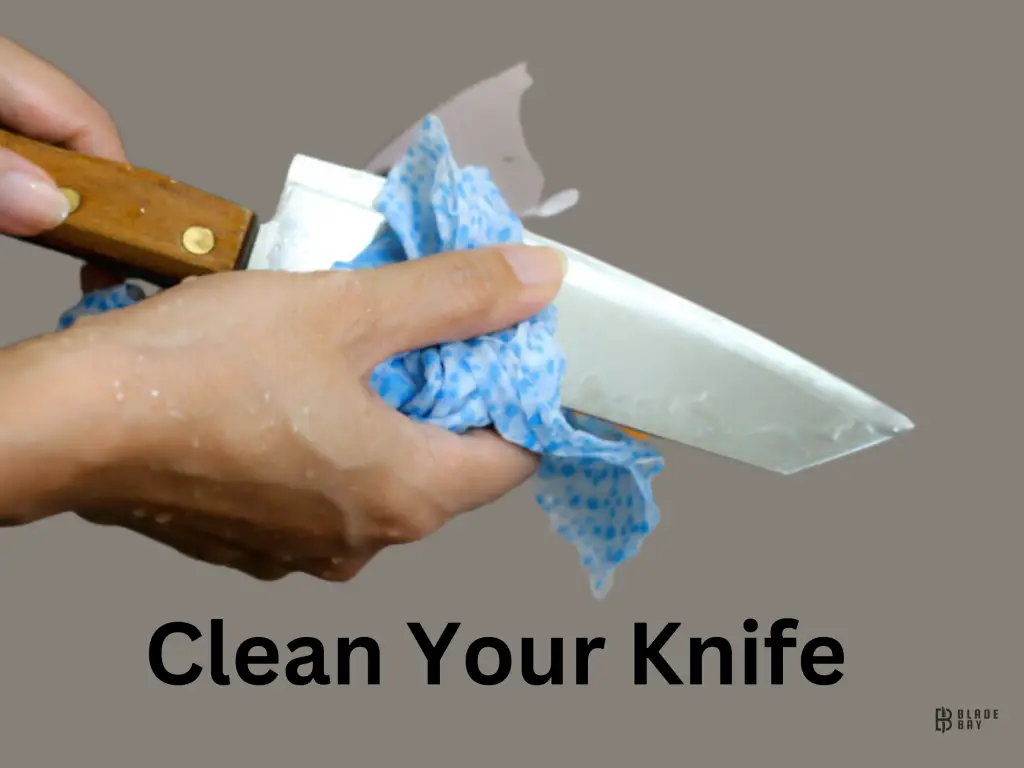
How to clean your carbon knife properly?
Keeping your carbon steel knife clean is crucial to maintain its longevity and sharpness. Here are some easy steps to properly clean your knife:
Step 1: Rinse the blade with warm water and mild soap. Avoid using harsh detergents or abrasive cleaners as they can damage the blade.
Step 2: Dry the blade thoroughly with a clean cloth to prevent rust or corrosion. Make sure to dry both sides of the blade and the handle.
Step 3: Apply a few drops of mineral oil or food-grade oil to a soft cloth and wipe the blade down. This helps to protect the blade and prevent rust from forming.
Step 4: Store your knife in a dry place, away from moisture or humidity. Avoid storing it in a sheath or leather case as they can trap moisture and cause rust to form.
By following these simple steps, you can keep your carbon steel knife in top condition and ensure that it lasts for years to come.
Conclusion
In conclusion, taking care of your carbon steel knife is essential to ensure its longevity and optimal performance.
From proper storage to regular sharpening and cleaning, there are various steps you can take to keep your knife in excellent condition.
Remember to always use a cutting board and avoid cutting hard materials to prevent chipping or damaging the blade.
With proper care, your carbon steel knife can last for years to come and continue to be a valuable tool in your kitchen.
FAQs
1.What is a carbon steel knife used for?
Ans: Carbon steel knives are versatile tools that can be used for a wide range of cutting tasks in the kitchen, such as slicing meats and vegetables, chopping herbs and fruits, and even filleting fish.
The sharp blade and durability of carbon steel make it a popular choice among professional chefs and home cooks alike.
2.Can I put my carbon steel knife inside the dishwasher?
Ans: It is not recommended to put your carbon steel knife inside the dishwasher as the high heat and abrasive detergents can damage the blade and handle. It’s best to hand wash your knife with mild soap and water, and dry it thoroughly after use.
3.What is the best carbon steel for knives?
Ans: When it comes to carbon steel for knives, there are a few options to consider. Some of the best carbon steels for knives include 1095, 52100, and O1.
Each type of steel has its own unique properties and benefits, so it’s important to choose the one that best fits your needs and preferences.
Ultimately, the best carbon steel for your knife will depend on factors such as your intended use, maintenance routine, and budget.
4. Is a carbon steel knife the same as a high carbon stainless steel knife?
Ans: Carbon steel knives and high carbon stainless steel knives are not the same.
While both contain carbon, the latter also contains chromium and other metals to increase durability and resistance to rust and stains.
Carbon steel knives, on the other hand, are prone to rust and require more maintenance but are favored by some for their sharpness and edge retention.
5. Is carbon steel safe for health?
Ans: Yes, carbon steel is safe for health. In fact, many professional chefs prefer to use carbon steel knives.


